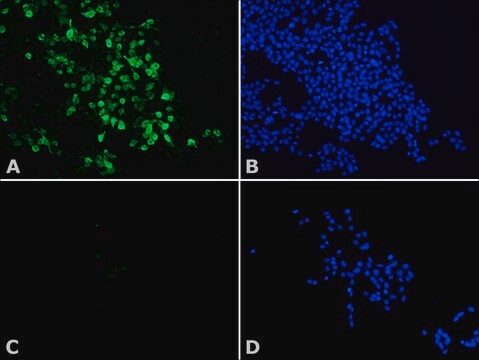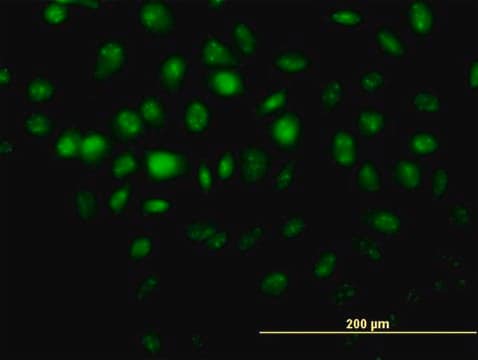おすすめの製品
由来生物
mouse
品質水準
結合体
unconjugated
抗体製品の状態
purified immunoglobulin
抗体製品タイプ
primary antibodies
クローン
HDAC8-48, monoclonal
形状
buffered aqueous solution
分子量
antigen ~43 kDa
化学種の反応性
human
濃度
2.0-2.5 mg/mL
テクニック
indirect ELISA: suitable
microarray: suitable
western blot: 4 μg/mL using nuclear extracts of HeLa cells
アイソタイプ
IgG1
UniProtアクセッション番号
輸送温度
dry ice
保管温度
−20°C
ターゲットの翻訳後修飾
unmodified
遺伝子情報
human ... HDAC8(55869)
関連するカテゴリー
詳細
Histone deacetylases (HDACs) are competing enzymes, belonging to histone deacetylase family. There are two classes of HDACs with six to seven different types of HDACs proteins. HDAC1,HDAC2, HDAC3, and HDAC8 belong to Class I HDACs and HDAC4, HDAC6, HDAC7, HDAC9, and HDAC10 belong to Class II HDACs. Class I HDACs consists of a single deacetylase domain at the N-termini and diversified C-terminal regions, while Class II contains a deacetylase domain at C-terminal position. Studies show that HDAC8 is a sex-linked gene located on the chromosome at position Xq21.2 - q21.3. HDAC8 gene has a molecular weight of 43kDa and it encodes a 377 amino acid protein. It is present within the nucleas. HDAC8 mRNA is seen in heart, lung, kidney, and pancreas.
Monoclonal Anti-Histone Deacetylase 8 (HDAC8) (mouse IgG1 isotype) is derived from the HDAC8-48 hybridoma produced by the fusion of NS-1 mouse myeloma cells and splenocytes from BALB/c mice immunized with recombinant human HDAC8.
免疫原
リコンビナントヒトHDAC8
アプリケーション
Monoclonal Anti-Histone Deacetylase 8 (HDAC8) antibody produced in mouse has been used in :
- enzyme linked immunosorbent assay (ELISA)
- immunoblotting
- immunofluorescence staining
生物化学的/生理学的作用
Histone deacetylation results in transcription repression leading to the formation of tight nucleosomal structure which prevents DNA accessing. HDAC8 controls HDAC activity on H4 histone peptide substrates. HDAC8 is similar to the HDAC class I enzymes. In vitro expression and activity of HDAC8 was examined using FLAG tagged- HDAC8 and HDAC1. These were transfected into HeLa cells and Sf9 insect cells. After the immunoprecipitation of cell lysates the expression results were confirmend using Western blotting. Studies show that HDAC8 may play a role in transcriptional regulation and could possibly be regulated in a temporal or compartment-specific manner.
物理的形状
0.01 M PBS溶液(pH 7.4, 15 mMアジ化ナトリウム含有)。
免責事項
Unless otherwise stated in our catalog or other company documentation accompanying the product(s), our products are intended for research use only and are not to be used for any other purpose, which includes but is not limited to, unauthorized commercial uses, in vitro diagnostic uses, ex vivo or in vivo therapeutic uses or any type of consumption or application to humans or animals.
適切な製品が見つかりませんか。
製品選択ツール.をお試しください
試験成績書(COA)
製品のロット番号・バッチ番号を入力して、試験成績書(COA) を検索できます。ロット番号・バッチ番号は、製品ラベルに「Lot」または「Batch」に続いて記載されています。
An atlas of histone deacetylase expression in breast cancer: fluorescence methodology for comparative semi-quantitative analysis
Ververis K and Karagiannis TC
American Journal of Translational Research, 4(1), 24-24 (2012)
Katherine Ververis et al.
American journal of translational research, 4(1), 24-43 (2012-02-22)
The histone deacetylase inhibitors, suberoylanilide hydroxamic acid (Vorinostat, Zolinza™) and depsipeptide (Romidepsin, Istodax™) have been approved by the US Food and Drug Administration for the treatment of refractory cutaneous T-cell lymphoma. Numerous histone deacetylase inhibitors are currently undergoing clinical trials
Satoshi Inoue et al.
Cancer research, 66(13), 6785-6792 (2006-07-05)
From work done largely on derived cell lines, it has been suggested that tumor necrosis factor-related apoptosis-inducing ligand (TRAIL) might be a therapeutic target for many forms of malignancy. However, use of primary tumor cells, including chronic lymphocytic leukemic (CLL)
Xuelian Xu et al.
PloS one, 6(2), e17138-e17138 (2011-03-02)
Pediatric acute myeloid leukemia (AML) remains a challenging disease to treat even with intensified cytarabine-based chemotherapy. Histone deacetylases (HDACs) have been reported to be promising therapeutic targets for treating AML. However, HDAC family members that are involved in chemotherapy sensitivities
J J Buggy et al.
The Biochemical journal, 350 Pt 1, 199-205 (2000-08-06)
Histone deacetylases (HDACs) are a growing family of enzymes implicated in transcriptional regulation by affecting the acetylation state of core histones in the nucleus of cells. HDACs are known to have key roles in the regulation of cell proliferation [Brehm
ライフサイエンス、有機合成、材料科学、クロマトグラフィー、分析など、あらゆる分野の研究に経験のあるメンバーがおります。.
製品に関するお問い合わせはこちら(テクニカルサービス)








